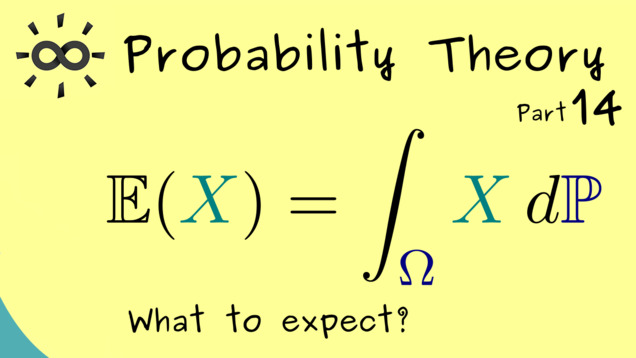
-
Title: Expectation and Change-of-Variables
-
Series: Probability Theory
-
YouTube-Title: Probability Theory 14 | Expectation and Change-of-Variables
-
Bright video: https://youtu.be/EhVbqe8J_Ww
-
Dark video: https://youtu.be/rZtltvKNA2A
-
Ad-free video: Watch Vimeo video
-
Quiz: Test your knowledge
-
Dark-PDF: Download PDF version of the dark video
-
Print-PDF: Download printable PDF version
-
Thumbnail (bright): Download PNG
-
Thumbnail (dark): Download PNG
-
Subtitle on GitHub: pt14_sub_eng.srt missing
-
Definitions in the video: expectation of a random variable
-
Timestamps (n/a)
-
Subtitle in English (n/a)
-
Quiz Content
Q1: Let $(\Omega, \mathcal{A}, \mathbb{P})$ be a probability space and $X \colon \Omega \rightarrow \mathbb{R}$ be a random variable. What is not correct for the expectation $\mathbb{E}(X)$?
A1: $\mathbb{E}(X) \in \mathbb{R}$
A2: $\mathbb{E}(X) = \int_{\Omega} X , d\mathbb{P}$
A3: $\mathbb{E}(X) = \int_{\Omega} X(\omega) , d\mathbb{P}(\omega)$
A4: $\mathbb{E}(X) = \int_{X(\Omega)} x , d\mathbb{P}_X(x)$
A5: $\mathbb{E}(X) = \int_{X(\Omega)} , d\mathbb{P}_X(x)$
Q2: Let $(\Omega, \mathcal{A}, \mathbb{P})$ be a probability space and $X \colon \Omega \rightarrow \mathbb{R}$ be a random variable with a discrete distribution. Which statement is correct?
A1: $\mathbb{E}(X) = \sum_{j=1}^\infty j^2 $
A2: $\mathbb{E}(X) = \sum_{x \in \mathbb{R}} \mathbb{P}(X = x)$
A3: $\mathbb{E}(X) = \sum_{x \in \mathbb{R}} x \cdot \mathbb{P}(X = x)$
A4: $\mathbb{E}(X) = \sum_{x \in \mathbb{R}} x^2 \cdot \mathbb{P}(X = x)$
Q3: Let $(\Omega, \mathcal{A}, \mathbb{P})$ be a probability space and $X \colon \Omega \rightarrow \mathbb{R}$ be a random variable with a continuous distribution given by a pdf $f_X$. Which statement is correct?
A1: $\mathbb{E}(X) = \int_{\mathbb{R}} x , dx$
A2: $\mathbb{E}(X) = \int_{\mathbb{R}} x f_X(x) , dx$
A3: $\mathbb{E}(X) = \int_{\mathbb{R}} x^2 f_X(x) , dx$
-
Last update: 2024-10